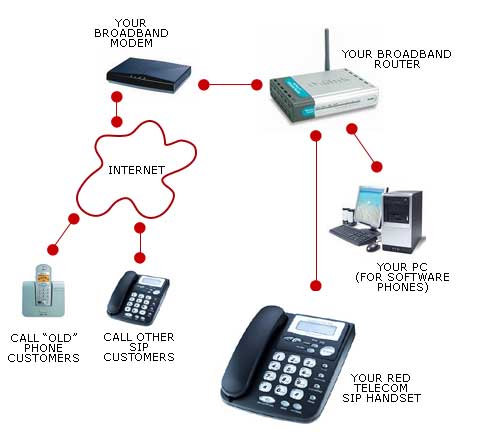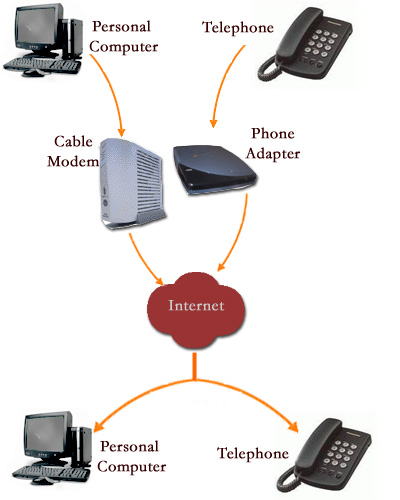Voice over Internet Protocol (VoIP)
VOIP stands for Voice Over Internet Protocol and refers to a technology that allows people to make phone calls over the internet instead of traditional phone lines.
Think of it like this: Instead of having to use a physical telephone line to make a call, you can use the internet as the connection between you and the person you want to talk to. Just like you use the internet to send emails, you can also use it to make phone calls.
This has several benefits, such as being able to make calls from anywhere there is an internet connection, lower cost for long-distance calls, and often having additional features the ability to call multiple people at once or start a conference call.
In essence, VOIP allows you to have a phone conversation using your computer or smartphone, without the need for a traditional telephone line. It's like a modern way of making phone calls and can make staying in touch with friends and family much easier, especially if they are far away.
Here are some illustration of how VoIP works:

Using an ATA (Ananlog Telephone Adapter) you can also use your traditional analog telephone to make VoIP calls:

Voice over Internet Protocol (VoIP) is a technology that has revolutionized the way people communicate in Australia and around the world. It allows individuals and businesses to make phone calls over the internet instead of the traditional Public Switched Telephone Network (PSTN). In recent years, the adoption of VoIP has grown rapidly in Australia due to its many benefits, such as lower cost, improved call quality, and increased flexibility.
One of the biggest advantages of VoIP is its low cost. VoIP calls are often much cheaper than traditional PSTN calls, especially for long-distance and international calls. This has made VoIP a popular choice for both individuals and businesses, as it allows them to save money on their monthly telephone bills. Additionally, VoIP eliminates the need for a separate phone line, further reducing costs for consumers and businesses.
Another advantage of VoIP is its improved call quality. Unlike PSTN, which can experience poor call quality due to network congestion and other factors, VoIP calls are often clearer and more stable. This is because VoIP uses digital signals to transmit voice data, which is less susceptible to interference and degradation than traditional analog signals. Additionally, VoIP allows for features such as voice and video calls, instant messaging, and file sharing, further enhancing the quality of communication.
VoIP also offers increased flexibility compared to PSTN. With VoIP, individuals and businesses can make and receive calls from anywhere with an internet connection, eliminating the need to be in a specific location to make a call. This has made remote work and communication much easier and more efficient. Additionally, VoIP allows for the integration of various communication methods, such as video and instant messaging, into a single platform, further improving the efficiency and ease of communication.
However, despite its many benefits, VoIP still has some limitations and challenges in Australia. For example, the reliability and security of VoIP can be a concern, particularly during power outages. Additionally, the availability and quality of internet services can affect the reliability and quality of VoIP calls, especially in rural and remote areas.
In conclusion, VoIP has become an increasingly popular technology in Australia, offering many benefits such as lower cost, improved call quality, and increased flexibility. While there are still some challenges to overcome, the adoption of VoIP will likely continue to grow in Australia as more individuals and businesses seek to improve their communication and reduce their costs.
